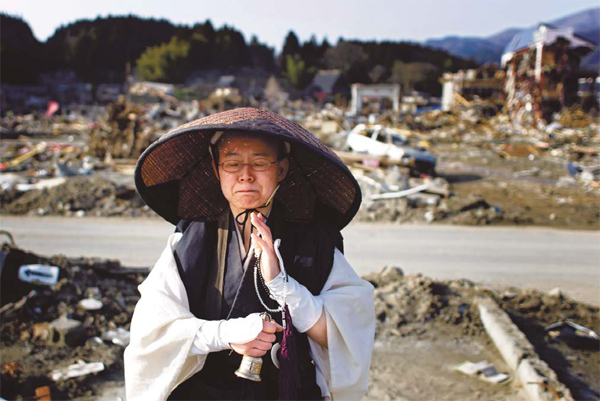Asia
Japanese soldiers begin search for bodies
Updated: 2011-04-11 06:30
(China Daily)
 A Japanese Buddhist monk prays at an area devastated by the March 11 earthquake and tsunami in Rikuzentakata, Iwate prefecture, Japan, on April 10, 2011. [Photo/Agencies] |
TOKYO - Around 22,000 soldiers started an intensive search on Sunday for bodies along Japan's northern Pacific coast as the country prepared to mark a month since the March 11 earthquake and tsunami.
The maritime search was focusing on waters off hard-hit Rikuzentakata, a tiny city in Iwate prefecture that was largely destroyed by the tsunami.
A similar mass search was conducted last weekend for three days over the same coastal areas, but only led to the discovery of about 80 bodies.
The huge earthquake and subsequent tsunami killed 13,000 people, left around 15,000 unaccounted for and more than 150,000 homeless.
According to NHK, Japan's Prime Minister Naoto Kan guaranteed the Miyagi governor that 70,000 temporary houses will be built as soon as possible when he visited the quake-hit prefecture on Sunday morning. And Kan's government will convene a panel of experts this week to work out a blueprint for reconstruction.
The magnitude-9.0 earthquake and subsequent tsunami knocked out a sizable portion of the nation's electricity supply, creating a ripple effect that has spread throughout the economy and leaving Japan with new problems.
"Over the past 20 years, the primary cause of economic downturns has been deficient aggregate demand," BNP Paribas Chief Economist Ryutaro Kono said in a research note.
"The economic contraction expected now, however, will be largely due to severe supply constraints."
Put simply, the main challenge now facing Japan is getting companies to produce more, rather than cajoling consumers to spend.
Central to that conundrum lies the power company most severely hit by the disaster, Tokyo Electric Power Co (TEPCO) - a key cog in Japan's vast economic machine.
Japan hopes to stop pumping radioactive water into the sea on Sunday, which should help ease concerns in neighboring countries over the spread of radiation from the worst nuclear crisis since Chernobyl in 1986.
But problems in restoring cooling systems at the crippled Fukushima nuclear plant mean more contaminated water may eventually be pumped into the sea if the complex again runs out of storage capacity.
"We cannot say what the outlook is for the next stage," Hidehiko Nishiyama, a deputy director-general of the Nuclear and Industrial Safety Agency, said on Sunday.
"As soon as possible we would like to achieve stable cooling and set a course towards controlling radiation," Nishiyama added.
Before the quake TEPCO's production capacity stood at 64.5 million kW as one of the world's biggest power companies, but the quake and tsunami knocked it down to 31 million kW.
AFP - Xinhua - China Daily
E-paper

Green light
F1 sponsors expect lucrative returns from Shanghai pit stop
Buying into the romance
Born to fly
Light of hope
Specials

Share your China stories!
Foreign readers are invited to share your China stories.

No more Mr. Bad Guy
Italian actor plans to smash ‘foreign devil’ myth and become the first white kungfu star made in China.

Art auctions
China accounted for 33% of global fine art sales.




